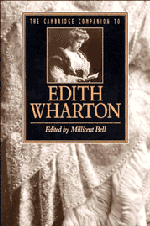Book contents
- Frontmatter
- Introduction
- 1 The Social Subject in The Age of Innocence
- 2 Edith Wharton and the Science of Manners
- 3 Edith Wharton and Race
- 4 The Custom of the Country
- 5 The Female Conscience in Wharton's Shorter Fiction
- 6 Law, Language, and Ritual in Summer
- 7 The House of Mirth
- 8 The Fruit of the Tree
- 9 The Valley of Decision
- 10 Edith Wharton's Valley of Decision
- Bibliography
- Index
- Series List
4 - The Custom of the Country
Spragg and the Art of the Deal
Published online by Cambridge University Press: 28 May 2006
- Frontmatter
- Introduction
- 1 The Social Subject in The Age of Innocence
- 2 Edith Wharton and the Science of Manners
- 3 Edith Wharton and Race
- 4 The Custom of the Country
- 5 The Female Conscience in Wharton's Shorter Fiction
- 6 Law, Language, and Ritual in Summer
- 7 The House of Mirth
- 8 The Fruit of the Tree
- 9 The Valley of Decision
- 10 Edith Wharton's Valley of Decision
- Bibliography
- Index
- Series List
Summary
No one knows where he comes from, but suddenly there he is in Apex, Kansas - first behind the counter at Luckabuck's Dollar Shoe Store, then at the office of the coal merchants, then at the Apex Water Works. Quickly he becomes “a leading figure in the youthful world of Apex,” and, despite some scandals, he is clearly a man of destiny. “Great men,” as he notes, “always gravitate to the metropolis,” (696), so, though he is red and glossy and balding and swaggering, he makes it to New York. His rise goes beyond the meteoric stage to a kind of stability:
It was said that he had bought a house in Seventy-second Street, then that he meant to build near the Park; one or two people . . . had been to his flat in the Pactolus, to see his Chinese porcelains and Persian rugs; now and then he had a few important men to dine at a Fifth Avenue restaurant; his name began to appear in philanthropic reports and on municipal committees (there were even rumours of his having been put up at a well-known club); and the rector of a wealthy parish, who was raising funds for a chantry, was known to have met him at dinner and to have stated afterward that “the man was not wholly a materialist.” (925)
As he becomes ever more successful, indeed a billionaire, he develops “a growing passion for pictures and furniture” and a burning “desire to form a collection which should be a great representative assemblage of unmatched specimens” (976). His goal is “to have the best . . . not just to get ahead of the other fellows, but because I know it when I see it” (976).
- Type
- Chapter
- Information
- The Cambridge Companion to Edith Wharton , pp. 87 - 97Publisher: Cambridge University PressPrint publication year: 1995
- 2
- Cited by

